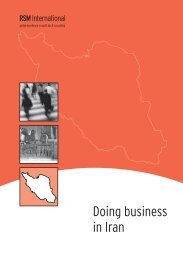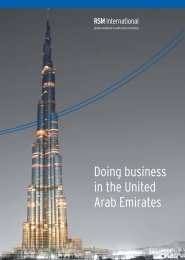Doing Business in India - RSM Austria
Doing Business in India - RSM Austria
Doing Business in India - RSM Austria
Create successful ePaper yourself
Turn your PDF publications into a flip-book with our unique Google optimized e-Paper software.
The requirements for public and private companies are as follows:<br />
Requirements Public Private<br />
M<strong>in</strong>imum numbers of subscribers/shareholders/members 7 2<br />
Maximum number of subscribers/shareholders/members No limit 50<br />
M<strong>in</strong>imum number of directors 3 2<br />
Therefore even if a foreign company wants to <strong>in</strong>corporate its 100% subsidiary <strong>in</strong><br />
<strong>India</strong>, it will need one other shareholder, which could be another foreign body<br />
corporate or foreign resident <strong>in</strong>dividual or a <strong>India</strong>n resident <strong>in</strong>dividual, who would<br />
hold at least one share, as a nom<strong>in</strong>ee of the foreign company or <strong>in</strong> his own name. The<br />
third option is for the second shareholder to be an <strong>India</strong>n resident or Foreign<br />
resident <strong>in</strong>dividual who could hold one share jo<strong>in</strong>tly with the foreign company <strong>in</strong><br />
order to satisfy the requirement of a m<strong>in</strong>imum of two shareholders. The first<br />
arrangement is, however, preferable <strong>in</strong> case of private companies <strong>in</strong> order to reta<strong>in</strong><br />
the character of the <strong>India</strong>n company as a “pure” private company.<br />
Directors are responsible for the management of the day to day affairs of the<br />
company. Unless otherwise required by the company’s articles, directors need not<br />
be shareholders. The directors should meet periodically by conven<strong>in</strong>g Board<br />
Meet<strong>in</strong>gs. There should be at least one board meet<strong>in</strong>g <strong>in</strong> each quarter and four<br />
board meet<strong>in</strong>gs <strong>in</strong> a year. Decisions taken are resolved by pass<strong>in</strong>g appropriate Board<br />
Resolutions. The directors can pass resolution by circulation <strong>in</strong> certa<strong>in</strong><br />
circumstances without hold<strong>in</strong>g a Board Meet<strong>in</strong>g.<br />
In case of every public company (and a private company, which is a subsidiary of a<br />
public company) at least two-thirds (2/3) of the total number of directors are liable<br />
to retire by rotation (one-third of such directors shall retire at every AGM). The<br />
rema<strong>in</strong><strong>in</strong>g one-third (1/3) directors (non-rotational) may be appo<strong>in</strong>ted as provided<br />
<strong>in</strong> the company’s AoA.<br />
In the case of a private company, which is not a subsidiary of a public company, the<br />
appo<strong>in</strong>tment of directors may be as per the procedure specified <strong>in</strong> its AoA. Where<br />
the AoA do not provide otherwise, the directors are to be appo<strong>in</strong>ted <strong>in</strong> a General<br />
meet<strong>in</strong>g. The provisions relat<strong>in</strong>g to rotational retirement of directors do not apply <strong>in</strong><br />
case of a private company, which is not a subsidiary of a public company.<br />
A person cannot be a director <strong>in</strong> more than 15 public limited companies. Alternate<br />
directorships, directorships <strong>in</strong> private companies which are neither subsidiaries nor<br />
hold<strong>in</strong>g companies of a public company and directorships <strong>in</strong> unlimited liability<br />
companies) are not considered for the above purpose. Every public limited company<br />
should have at least 3 directors, but not more than 12 (unless it has received<br />
approval of the Department of Corporate Affairs). On other hand, a private limited<br />
company must have at least 2 directors. An alternate director may be appo<strong>in</strong>ted by<br />
the Board of Directors when a director is expected to rema<strong>in</strong> outside the state <strong>in</strong><br />
which meet<strong>in</strong>gs of the Board are ord<strong>in</strong>arily held for a cont<strong>in</strong>uous period of three<br />
months.<br />
Directors can be appo<strong>in</strong>ted by the shareholders <strong>in</strong> the annual general meet<strong>in</strong>g, by<br />
the board of directors and also by the central government. Directors may also be<br />
34<br />
DOING BUSINESS IN INDIA














